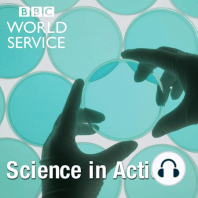30 min listen
Unexpected black hole in our galaxy
ratings:
Length:
31 minutes
Released:
Apr 18, 2024
Format:
Podcast episode
Description
A black hole just discovered in our Milky Way galaxy, weighing 33 times the mass of the Sun, and dating back to near the time of the Big Bang, gives new clues to the origins of this dark astronomical mysteries. And dancing with a Sun-like star in our galactic neighbourhood, it offers a great opportunity for astronomers to take a detailed look in coming years, as astronomer Professor Gerry Gilmore of Cambridge University tells the programme. Presenter Roland Pease has headed to the lab of Professor Ludovic Orlando in Toulouse, France where they are extracting ancient DNA from horses as part of a project called “Horsepower” - to reveal how our prehistoric ancestors tamed and domesticated these powerful animals (long after cattle and sheep) and in the process helped shape the extraordinary history of the first states of China and Mongolia.
And a deep look into the mechanisms of addiction – showing how drugs of abuse, such as cocaine, hijack the neuronal pathways that had evolved to drive our innate needs such as eating and drinking. Roland hears from psychiatrist Eric J. Nestler of the Friedman Brain Institute at Icahn School of Medicine at Mount Sinai in New York, how this could one day improve addiction treatments. Presenter: Roland Pease
Producer: Jonathan Blackwell
Production Coordinator: Jana Bennett-Holesworth (Image: An artist's impression shows the orbits of the most massive stellar black hole in our galaxy, dubbed Gaia BH3, and a companion star. Credit: European Southern Observatory via Reuters)
And a deep look into the mechanisms of addiction – showing how drugs of abuse, such as cocaine, hijack the neuronal pathways that had evolved to drive our innate needs such as eating and drinking. Roland hears from psychiatrist Eric J. Nestler of the Friedman Brain Institute at Icahn School of Medicine at Mount Sinai in New York, how this could one day improve addiction treatments. Presenter: Roland Pease
Producer: Jonathan Blackwell
Production Coordinator: Jana Bennett-Holesworth (Image: An artist's impression shows the orbits of the most massive stellar black hole in our galaxy, dubbed Gaia BH3, and a companion star. Credit: European Southern Observatory via Reuters)
Released:
Apr 18, 2024
Format:
Podcast episode
Titles in the series (100)
From batteries to distant worlds: Nobel Prize wins for a range of well-known discoveries by Science In Action
